![]()
One of the most sought-after writers in comics today, Brian Azzarello is one of the six acclaimed scribes to pen a segment within “Batman Gotham Knight,” the third in the ongoing series of DC Universe animated original PG-13 movies.
Unlike many of his past works, Azzarello’s segment – entitled “Working Though Pain” – takes a decidedly non-violent direction. The segment, which falls chronologically as the fifth of the six segments, explores an early chapter of Bruce Wayne’s training as a mysterious and exotic Indian woman named Cassandra introduces Batman to techniques that would help him to conquer the physical and spiritual consequences of what he does.
Azzarello achieved widespread notoriety – and garnered multiple Eisner Awards – for “100 Bullets,” a collaboration with artist Eduardo Risso which was published by Vertigo for DC Comics. He has continually broken new ground with offerings like Vertigo’s “Jonny Double,” “Hellblazer” and “Loveless” series. Azzarello is no stranger to Batman, having written for the character in “Broken City,” “Batman/Deathblow: After the Fire,” within the “Batman Gotham Knights” series and in “Lex Luthor: Man of Steel.”
A Chicago resident, Azzarello will travel across town to join fellow “Batman Gotham Knight” writers Alan Burnett and Josh Olson, along with producer Bruce Timm, for the film’s world premiere at Wizard World Chicago in late June. “Batman Gotham Knight” will arrive July 8, 2008 on DVD and Blu-Ray disc, and will also be available that day On Demand via digital cable and for download through broadband sites. The film is produced as a collaboration between DC Comics, Warner Premiere, Warner Home Video and Warner Bros. Animation.
Azzarello took time away from his Mac Power Book to discuss “Batman Gotham Knight,” the character of Batman, the motivations of a writer, and a little cooking, too.
Question: For starters, what was your overall impression of “Batman Gotham Knight,” and were you pleased with your segment?
Brian Azzarello: I liked the film – it’s a very interesting take on the Batman character. It holds together cohesively, yet each episode is strikingly different. And I loved (my segment) – it’s great. I really liked the animation. It was fascinating seeing my words moving around. When I write, I see it in print – I don’t see it moving. So it was fun and it was a good experience.
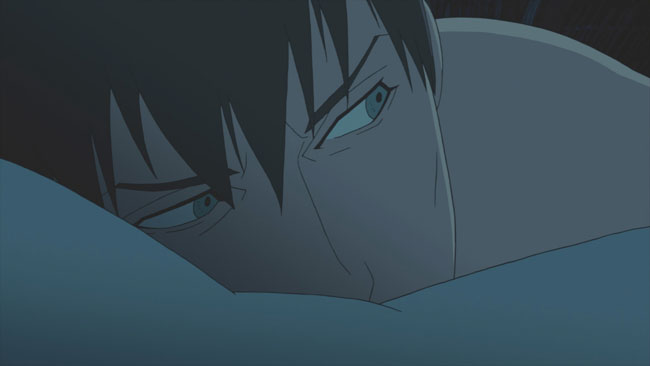
Question: How did you find the translation from your written page to the vision of the Japanese director and artists?
Brian Azzarello: I was surprised how seamless the translation was. I definitely got what I wrote. The hospital scene is almost exactly the way I thought of it, while the fight scenes – that’s where the animators really put their “wow” into it. But I expected that. Usually that’s where the animators just go crazy.
Question: Were there any particular visuals that struck you within your segment?
Brian Azzarello: Seeing wounded Batman – now that struck me. I enjoy wounded Batman. It humanizes him. It showed a true physical struggle, and that’s something you can relate to. And the character Cassandra was a bit hotter than I thought she’d be … but that’s okay.
Question: When you’re writing for comics – and now for animation – do you put fairly detailed direction between the dialogue, or is it more of a collaborative process for you and the artist/animator?
Brian Azzarello: I wrote the script and then I handed it off, and that’s pretty much the same relationship I have in comics. I really trust my collaborators, and I try to leave them plenty of room so they can bring their strengths to the work. I think that happened in this film, and definitely for my segment – the animation is just amazing. Really amazing.

I have more of an affinity for the stage than I do for the screen, so I’m very conscious of the dialogue. And because I’ve always worked with collaborators, I tend to leave the visuals up to them – on purpose. It’s my belief that if I get the dialogue right, and the artist understands what motivates the characters and what they’re saying, then the visuals will come.
Question: You’re fairly particular about the projects you accept. How’d you get involved with this film, and what made you say yes?
Brian Azzarello: Gregory Noveck of DC Comics talked to my agent, then I had a conference call to discuss the story. They explained the film to me in broad strokes, and asked me to come up with an idea. I chose to focus more on Bruce Wayne, and they liked my pitch. As always happens, they needed the script yesterday, and I was I was on my way to Europe at the time. All I can tell you is that the hotel room in Barcelona was pretty nice, but I can’t tell you much about the city.
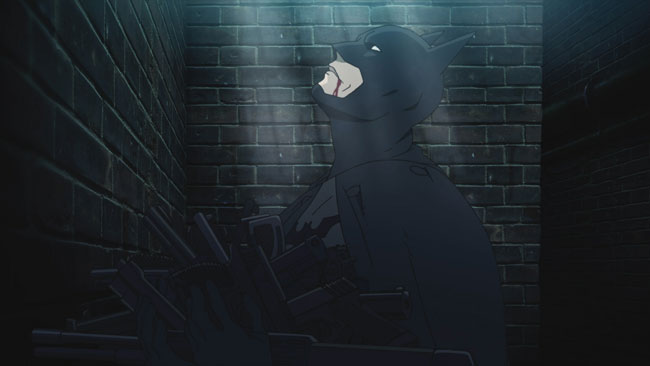
Question: You were quoted in a UGO article as saying “Hollywood is nowhere I aspire to be” … and yet, here you are. What happened?
Brian Azzarello: Well, the production may be in Hollywood, but I’m in Chicago – and I’m going to stay here. Is that semantics? I’m not sure. I enjoy doing the work, and I really liked writing for this project – I’d like to do it again. And I know there are people that would kill to work in Hollywood. I’m just not one of those people. I’ll do it, I have done it, but the project has to be right. I’ve been asked to write a lot of things that I’ve declined mainly because the projects didn’t interest me. If I were just writing to pull a paycheck, there’s a lot of other things I could be doing.
Question: What’s your motivation for writing?
Brian Azzarello: If I have a story, if I have something to say, that’s my motivation. For this film, I had something to say about Bruce Wayne as a character, what his motivations are. That there’s something dark and wrong about what drives him. Batman is a super hero and he does good. But I think the Bruce Wayne part of the character’s motivation is slightly twisted. Bruce’s motivations don’t come from a good place. He’s angry and, in that revenge is really his goal, he’s a dishonest character. That’s why he has to wear a mask. He’s doing good, but he’s not doing all the right things for all the right reasons.
That plays into this story. It should be a story about non-violence, but that’s the lesson that Bruce doesn’t learn. On the surface, Bruce is on a spiritual journey, but his spirit was corrupted when his parents were killed. And it’s not something that I think he’s even interested in fixing.
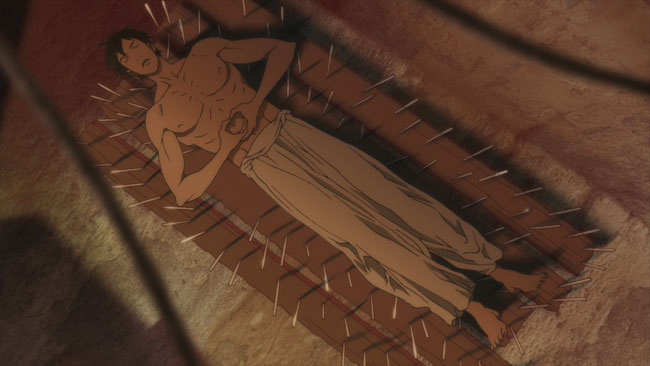
Question: How much research was involved in scripting a story set in India that focuses on the mind-over-matter theme of conquering your pain from within?
Brian Azzarello: I spent a lot of time surfing (the Internet) – it’s a wonder how we all have libraries at our fingerprints these days. I needed to do research on India, and I gathered a lot of information on pain management. What I learned is that a lot of pain management practitioners are con men.
Question: You’ve had some notable experience working on Batman – can you compare the differences in working on this Batman tale vs. “Batman/Deathblow: After the Fire” and “Broken City” or the “Batman: Gotham Knights” comics?
Brian Azzarello: Every time I approach Batman, I like to come from a different angle. In Deathblow, I saw him as a James Bond-type but on an urban level. For Broken City, he was the bitter private eye. On this project, I guess he’s lying to himself. He’s not intentionally conning Cassandra, but he does ultimately con her. He wants to learn what she knows, but he doesn’t want to know it for the reasons she teaches it. She finally figures out that he’s doing it for the wrong reason, but it isn’t until the end – and it’s not until then that even he understands that he’s been lying to himself.
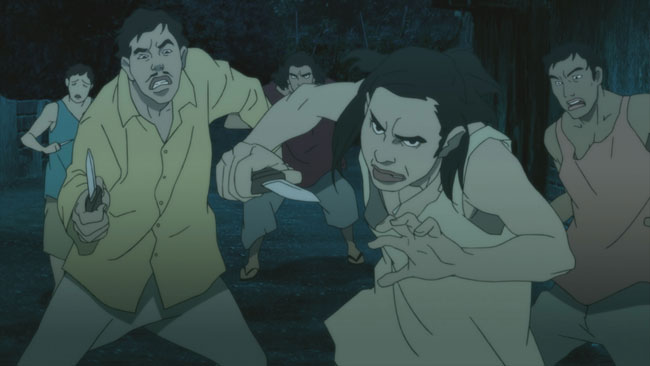
Question: What are you reading these days?
Brian Azzarello: I have a stack of books – The Crime Writer by Gregg Hurwitz; one of Jason Starr’s novels; and then I’ve got Mario Batali’s Italian Grill cookbook. I actually read a lot of cookbooks – I grew up around cooking, and cooking really relaxes me. Nine times out of 10, I’m cooking something Italian, but the weather is turning, so my grill has been fired up a lot lately. I love barbeque – it’s great to cook something for 8-10 hours. That’s such an American way of cooking, but I try to bring a lot of Mediterranean influences into that.
Question: So if you could hand-pick your next achievement, what would it be – win another Eisner, write the next Batman, or have your own show on Food Network?
Brian Azzarello: Well, having my own cooking show sounds like no work at all. Winning another Eisner would be nice. But I think I’d have to pick writing the next Batman – that would be the biggest challenge for me. As a freelancer, if you’re not challenging yourself, nobody is. Every day I have to paint myself into a corner and then write my way out of it.
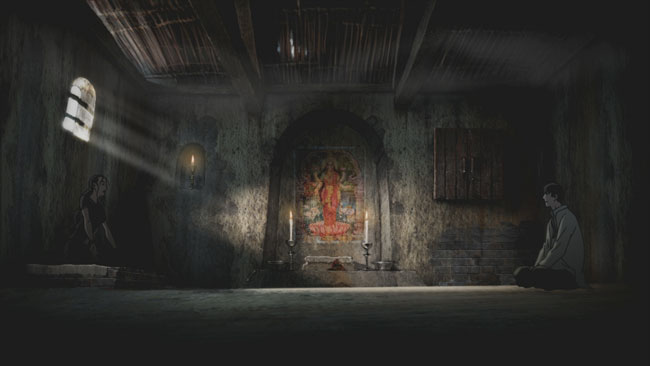
“Batman Gotham Knight” (c) Warner Bros. Ent Inc. “Batman” and all related characters and elements are trademarks of and (c) DC Comics. All Rights Reserved.



1 Comment
Looks like its going to be fantastic :)